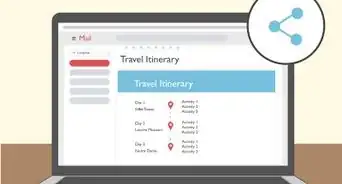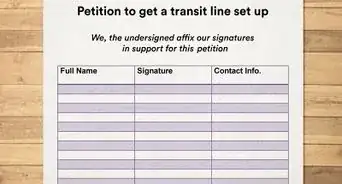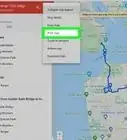This article was co-authored by Carmela Resuma, MPP. Carmela is the Executive Director of FLYTE, a non-profit organization headquartered in Georgetown, Texas that empowers students living in underserved communities through transformative travel experiences. Carmela has a Masters in Public Policy Analysis from New York University and is passionate about youth empowerment, social impact, and traveling.
There are 19 references cited in this article, which can be found at the bottom of the page.
This article has been viewed 71,134 times.
Traveling is an amazing opportunity that not everyone has the privilege of doing. Being a tourist means you get to experience different cultures, beliefs, people, and food, but it also comes with a level of personal responsibility. Since you’re visiting another country or state, it’s your duty to act as an ambassador and to leave a good impression on the locals in the country you're visiting. Being open to new experiences, having cultural sensitivity, and being equipped with the knowledge you need will ensure you’ll be a good tourist regardless of where you go.
Steps
Doing Your Research
-
1Learn key phrases or words in the language of the country you're going to. When you travel to a different country, it's important that you are able to communicate with people. While learning an entirely new language is unrealistic for most people, learning a couple of key phrases in the local language is not. Make sure to pick up a translation book before you travel so you can memorize important phrases.
- Even if you aren't very good at speaking the language and only know a couple of words, locals in the country you're visiting will appreciate and respect the gesture.
- Some common phrases tourists should learn are: "Hello", "Goodbye", "Thank you", "I need help", and "Do you speak English?"[1]
- While many countries teach English in primary school, don’t rely on it. The locals will appreciate it if you try to speak in their native tongue.[2]
-
2Check the weather if traveling domestically and dress appropriately. Countries will sometimes boast a wide variety of climates. Before you visit another region of your country, make sure that you know what the climate will be like so you can pack clothing that makes sense for the place you're visiting.[3]
- Places in the south like Florida and New Mexico in the U.S. enjoy a mild climate during the winter and get extremely hot in the summer.
- Countries in South America differ drastically, from warm dry climates to hot and humid ones.[4]
Advertisement -
3Conduct research on the country’s or state's customs and traditions. Being a good tourist includes being knowledgeable about the country or region you’re visiting. You also will want to find out what the local clothing looks like so you can dress appropriately.
- When traveling domestically, wearing clothes that resemble the local style will help you fit in.
- Figure out a couple of historic locations that you’d want to visit while you’re there and write them down in a list.
- Research any events that are going on in the city or else you may miss out on a unique cultural experience.[5]
-
4See what vaccines you need to get before visiting. Different countries have different infectious diseases, so it’s important that you get vaccinated so you don’t contract or spread sickness to locals or other people visiting with you. For instance, when traveling to Thailand it’s recommended that you get a Typhoid vaccine. [6]
- The Center for Disease Control and Prevention has an online tool that allows you to see what vaccines are recommended in certain countries.[7]
-
5Ask your tour guide questions. A tour guide is able to give you more intimate knowledge of the country or city you’re visiting. This know-how goes beyond what can be typically found in a guidebook or when searching online.[8]
- You can ask your tour guide about local businesses or services you can use while you’re visiting.
- Because your guide is likely a resident of the area, you can ask them about restaurants or bars that they prefer.
Respecting the Country or State You’re Visiting
-
1Be mindful of your speaking volume. Different cultures have different views on what the acceptable speaking volume is, but one way to make locals really hate you is to speak loudly when in public. Try to keep your volume at acceptable levels, and avoid yelling in public.
- In places like Japan, speaking loudly is a sign of disrespect.[9]
- In Muslim countries, speaking loudly is also a sign of a disrespect.
-
2Dress yourself according to the local customs. Dress according to local customs and be mindful of their religions which may look poorly upon some clothing choices.
-
3Participate in local festivals and parades. Instead of being a spectator, you should be a participant when it comes to local events. Whenever you get an opportunity, you should be engaging with the people who live in the place you’re visiting.
- When traveling domestically, many major cities celebrate different cultures and regions of the world in parades or festivals, that the public can attend.
- The Macy's Thanksgivings Day parade happens every year in Manhattan New York and has been a tradition in the U.S. since 1924.[12]
- The Holi festival is celebrated in India, Sri Lanka, and Nepal and is an event where people cover themselves in multi colored dyes.[13]
- The Venice Carnival is a huge festival that happens in Venice, Italy each year and is one of the biggest costume and art celebrations in the world. [14]
-
4Respect the wildlife and don’t feed animals. There’s a good chance that the indigenous animals that live in the country or region you’re visiting will be different than your local wildlife. However, this is not an excuse to feed or interact with them. Feeding wildlife can actually throw off the ecosystem and hurt and endanger the animals you’re feeding.
- As a result of tourists feeding monkeys in Morocco, the animals have become larger, more susceptible to disease, and more stressed.[15]
- Feeding wild animals can also be incredibly dangerous if you’re not familiar with the species.
- If you’re a hunter, make sure you are hunting legally in government designated areas.
-
5Don’t litter under any circumstances. One of the biggest signs of disrespect in any country or region you're visiting is to throw trash on the ground. If you can’t find a waste bin close by, just keep the trash on you until you have the opportunity to properly dispose of it.
- In Hong Kong, the penalty for littering or spitting is $1,500.[16]
Engaging the Local Community
-
1Buy locally made products and utilize local services that support the community. Seek out locally owned businesses and buy products or services from the people who live there. Do not fall victim to patronizing establishments that can be found in your home country or state because it feels comfortable.
- Supporting the local economy will encourage people to appreciate tourism.
- Take an interest in how products are being produced and the methods that they use. Many manufacturing methods in different countries are different than in the U.S.
- Remember to keep in mind customs regulations when purchasing products overseas. You may not be able to take some products back to your country.[17]
-
2Try different cuisine and support local restaurants. Even if you’re not the type of person who enjoys trying new things, it’s important that you try the cuisine found in local restaurants. You don’t need to eat something you don’t like, but putting in the effort will show the local people that you respect their culture and are willing to try.
- When traveling domestically, there can still be massive food variation from region to region.
- Be careful of unsanitary conditions in under developed countries. Some of these countries may have different hygienic standards and their food may be unsanitary and could make you sick. Choose a restaurant that has many local people in it.[18]
- Spread out your experiences over different restaurants in the area to get a full taste of the local food.
-
3Purchase local currency when traveling abroad. While major credit cards are accepted overseas, it will make your experience richer if you purchase products in local currency. You'll be able to purchase things from street vendors and local businesses who take cash only, and get a more organic experience as a result.
- Most major banks carry foreign currency which you can purchase[19]
- Some major banks offer international ATMs so you can withdraw cash in a foreign country.
- Inform your bank, even when traveling domestically, so they don’t think there’s suspicious activity on your account.
-
4Talk and interact with local people. Even if you don’t understand the native language when traveling abroad, it’s important that you engage with the local culture to better your traveling experience. Even though this may not mean engaging in complex conversation, it could be doing business with a local shop owner, or celebrating local traditions.
- When traveling domestically, make it a point to go out of your way to talk to local people.
- Sharing meals with people is a bonding experience that’s universal.
- If you’re traveling in a group, don’t rely on people in your group. Do your own thing and experience different cultures.
Expert Q&A
-
QuestionHow do I prepare myself for traveling?
 Carmela Resuma, MPPCarmela is the Executive Director of FLYTE, a non-profit organization headquartered in Georgetown, Texas that empowers students living in underserved communities through transformative travel experiences. Carmela has a Masters in Public Policy Analysis from New York University and is passionate about youth empowerment, social impact, and traveling.
Carmela Resuma, MPPCarmela is the Executive Director of FLYTE, a non-profit organization headquartered in Georgetown, Texas that empowers students living in underserved communities through transformative travel experiences. Carmela has a Masters in Public Policy Analysis from New York University and is passionate about youth empowerment, social impact, and traveling.
Traveling Specialist Before you go somewhere new, read a few posts from travel bloggers who've been to the place you're visiting. Of course, their experiences won't be the exact same as yours, but you'll still learn a lot about what to expect. You can also search the geo tag of a place on Instagram just to see what people post from there.
Before you go somewhere new, read a few posts from travel bloggers who've been to the place you're visiting. Of course, their experiences won't be the exact same as yours, but you'll still learn a lot about what to expect. You can also search the geo tag of a place on Instagram just to see what people post from there. -
QuestionHow can I be a good tourist?
 Community AnswerKnow where you wan't to go using a map or GPS. Try to remember street names and places. Understand the culture you are in and dress appropriately.
Community AnswerKnow where you wan't to go using a map or GPS. Try to remember street names and places. Understand the culture you are in and dress appropriately. -
QuestionWhich subjects can I choose in high school next year to make me a tourist?
 Community AnswerGeography and foreign languages can help in your pursuit; however, you become a tourist by visiting distant locations, no classes can accomplish this.
Community AnswerGeography and foreign languages can help in your pursuit; however, you become a tourist by visiting distant locations, no classes can accomplish this.
References
- ↑ http://trip.ustia.org/safety/articles/1231/20-common-phrases-to-know-when-traveling-abroad/
- ↑ http://www.nationsonline.org/oneworld/countries_by_languages.htm#English
- ↑ http://www.path2usa.com/usa-climate
- ↑ http://www.mapsofworld.com/world-maps/world-climate-map.html
- ↑ http://www.travelzoo.com/blog/20-tips-before-traveling-internationally/
- ↑ http://wwwnc.cdc.gov/travel/destinations/traveler/none/thailand
- ↑ http://wwwnc.cdc.gov/travel/destinations/list
- ↑ https://www.neamb.com/travel/8-questions-to-help-you-pick-your-perfect-guided-tour.htm
- ↑ http://matadornetwork.com/abroad/8-american-habits-lost-japan/
- ↑ http://www.pewresearch.org/fact-tank/2014/01/08/what-is-appropriate-attire-for-women-in-muslim-countries/
- ↑ https://www.weforum.org/agenda/2016/01/5-countries-with-the-strictest-dress-codes/
- ↑ http://travel.nationalgeographic.com/travel/free-to-see/parades-us/
- ↑ https://www.buzzfeed.com/ashleyperez/23-world-festivals-you-wont-want-to-miss?utm_term=.ch4WQ476q#.uuzD4mwY5
- ↑ https://www.carnevale.venezia.it/en/
- ↑ https://www.sciencedaily.com/releases/2016/05/160520142955.htm
- ↑ http://www.discoverhongkong.com/us/plan-your-trip/traveller-info/good-to-know/public-hygiene.jsp
- ↑ https://www.cbp.gov/travel/us-citizens/know-before-you-go/prohibited-and-restricted-items
- ↑ http://www.travelinsurancereview.net/tips-and-advice/health-awareness/travel-underdeveloped-countries/
- ↑ http://www.nbcnews.com/id/41282577/ns/travel-travel_tips/t/traveling-abroad-how-exchange-currency/#.V2te27grJ9M
About This Article
To be a good tourist, research the customs of the place you'll be visiting before you leave so you can dress and behave appropriately and respectfully. Also, make sure you treat the place you're traveling to with respect by not littering, feeding or touching wild animals, or treating locals rudely. During your time as a tourist, try to support the local community by buying locally made products and eating at local restaurants, which is also a great way to learn more about the culture there. To learn how to prepare for your trip, keep reading!


-Step-4.webp)








-Step-3.webp)
-Step-2.webp)






























































